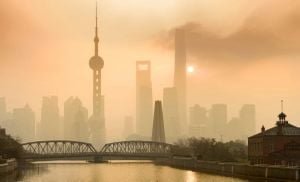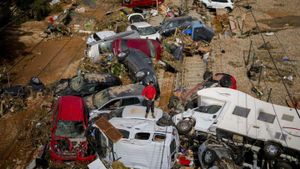At the United Nations General Assembly, developing nations made heartfelt pleas urging the wealthiest countries to step up their efforts to combat climate change. During the assembly, which has become ground zero for climate discussions, leaders from small island nations expressed their desperation over climate extremes and rising sea levels threatening their very existence.
"I wonder if our countries are moving farther away from the unity and the moral fortitude we require to protect our people," stated Cedric Schuster, the Samoan Minister of Natural Resources and Environment. He heads the Alliance of Small Island States (AOSIS), which has become increasingly vocal about the crisis. Schuster’s comments were directed particularly at the Group of 20 (G20) countries, responsible for over 80% of global greenhouse gas emissions.
He emphasized, “We need all countries, but particularly the G20, to lead the way on emissions cuts and climate finance. The vulnerable people of our world are drained by the lip service.” This sentiment was echoed by Malawi's climate minister, Yusuf Mkungula, who represented the Least Developed Countries negotiating bloc, stating, “Industrialized countries must lead the way.”
The stark reality of a growing chasm between those contributing to climate change and those bearing the brunt of its consequences was laid bare at the summit. Climate change has evolved beyond mere environmental concern; it's morphing every day to reflect issues of global justice.
Throughout the week, there were about 900 climate-themed events held across New York City, wherein world leaders drew attention to the urgent need for action. Bahamas Prime Minister Phillip Davis stressed the accelerating frequency of climate events, urging wealthy nations to maintain their focus on addressing these urgent challenges. He pointed out, "So far, the signals being sent [by countries] do not match the commitments made."
A different look at the international climate commitment came from major companies. Executives from Amazon, Iberdrola, and Vestas gathered to push global leaders to fulfill the promises made at COP28 to triple renewable energy capacity by 2030. Meanwhile, 50 U.S. banks announced their collaboration to boost investments aimed at clean energy, alongside another group calling for global nuclear energy expansion.
Despite such initiatives, research by Moody's Ratings revealed concerning trends. The report highlighted dire shortfalls of trillions of dollars required for climate investments to achieve net-zero emissions by 2050. Notably, it pointed out the more considerable costs associated with not investing—an alarming prospect for national governments already wrestling with high debt.
An additional local analysis showed over 40% of the world's major companies and cities currently lack clear plans or targets for emissions reductions. The 'commitment gap', as defined by the Net Zero Tracker from the University of Oxford, has emerged as climate issues compete with other pressing concerns such as wars, elections, and economic downturns for the attention of governments.
Dr. Ottmar Edenhofer, the director of the Potsdam Institute for Climate Impact Research, noted the timeliness of the discussions happening at the U.N. Climbing global temperatures dramatically change our planet's natural systems. He warned humanity has already inflected significant damage upon at least six of these systems, including key climate equilibria. With ocean acidification amid rising carbon dioxide levels rapidly claiming the seventh system, he remarked on the urgency with which world leaders must act.
Amidst these complex discussions, the voices of those on the frontlines of climate change are striving to illuminate the plight of the vulnerable. Climate action remains imperative, both for the sake of global stability and justice for those suffering the consequences of climate extremes they played little part in causing. The upcoming years may very well dictate the future health and safety of those living on the frontline of climate change; there’s no time to lose.
With the stakes as high as they are, leaders are returning home, hopeful yet increasingly aware of the challenges they’ll face implementing the promises made at this pivotal moment. Understanding and bridging the gap between commitments and actions will be fundamental to curbing climate change's devastating impact around the world.



